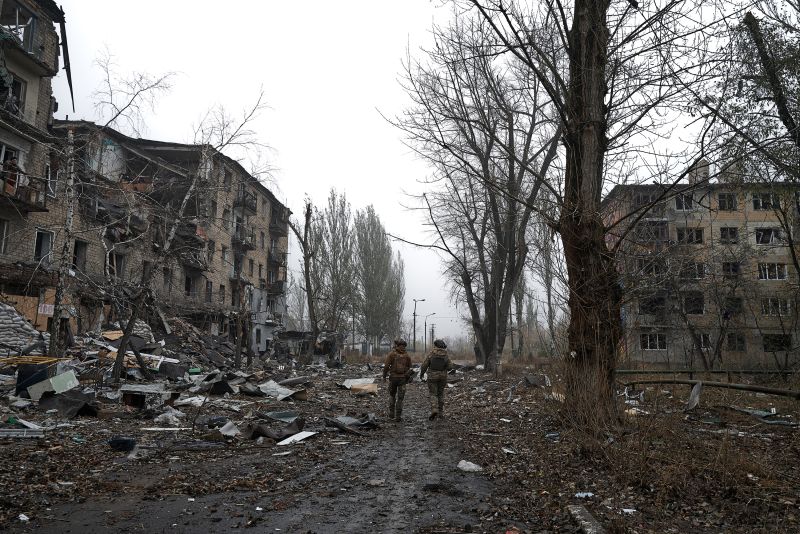
Claims Russia executes own soldiers and offensive intensifies: Here’s what to know about the latest in Ukraine
This week, Ukrainian forces continued to hold out against a renewed offensive in eastern Ukraine as the White House claimed Russia is executing its own troops for disobeying orders.
In southern Ukraine, authorities issued evacuation orders for civilians where Russia has stepped up aerial attacks.
Strikes in a western Ukrainian city blew out windows at a nuclear power plant, once again raising safety concerns.
Here are the key developments…
Executing its own
The US says Russia is executing its own soldiers and has threatened entire units with execution for failing to obey orders.
National Security Council coordinator for strategic communications John Kirby told reporters: “We have information that the Russian military has been actually executing soldiers who refuse to follow orders, we also have information that Russian commanders are threatening to execute entire units if they seek to retreat from Ukrainian artillery fire.”
Kirby did not provide further details on the claim that Russia was executing its own. Russia has previously been accused of using “barrier troops” to keep soldiers from deserting the front lines.
“It’s reprehensible to think about – that you would execute your own soldiers, because they didn’t want to follow orders, and now threatening to execute entire units is barbaric,” he said.
Russia’s mobilized forces in the region “remain under-trained, under-equipped and unprepared for combat,” Kirby said, and have been largely used in what he called “human wave tactics” as it attempts to forge ahead with a renewed offensive.
While Russia continues to have some offensive capability and may achieve some tactical gains on the battlefield, it continues to show no regard for the lives of soldiers,” Kirby told reporters.
Tough battles in Avdiivka and Kupiansk
Russia continues its brutal offensive in eastern Ukraine.
In the city of Avdiivka, Ukraine claimed it had been successful in repelling assaults and taking out large numbers of Russian soldiers.
Rain over the last few days has slowed down Russian forces as they continue efforts to encircle the city and take over high ground. “Moving on foot on wet ground is difficult, let alone moving heavy equipment,” a local military official said.
“Our warriors stopped them and inflicted heavy losses on the enemy, who lost at least a brigade of personnel,” Ukrainian President Volodymyr Zelensky said.
Avdiivka has been a front line city since 2014, when Moscow-backed separatists seized a large portion of the Donbas region. It has been under fire since Russia launched its full-scale invasion in February 2022. Most residents have fled the fighting. Some of the remaining civilians are trickling out of the city with the help of the police.
In Kupiansk, Ukrainian soldiers are fighting off Russian efforts to capture a strategic railway interchange.
Assaults are around the clock, according to Ukrainian military on the ground.
Kupiansk was occupied by Russian forces for nearly seven months early on in the war. Since its liberation in September 2022, the Ukrainian military has been trying to resist Russian assaults. The city is strategically important to prevent Russia from accessing the nearby Oskil River.
Zelensky said: “Kupiansk and Avdiivka are in heavy, tough battles, but our soldiers are holding their ground.”
Child evacuations
As Russian forces continue to pummel residential areas in the Kherson region with guided aerial bombs, officials have started mandatory evacuations of children.
Ninety children have been evacuated across 23 villages along the Ukrainian-controlled western bank of the Dnipro River in Kherson region.
Nearly 700 children still remain in areas that continue to come under heavy bombardment.
Since Wednesday, Russians have launched nearly 35 guided aerial bombs daily at settlements along the Dnipro River, killing at least eight civilians, including a 13-year-old boy in the town of Beryslav, according to Ukrainian officials.
Kherson region military administration Oleksandr Prokudin visited the most frequently shelled settlements to convince parents to take their children to safety. “Children need to be safe. To play in peace. Russian shelling deprives our children of all this,” he said.
At least 500 Ukrainian children have been killed and more than 1,000 have been injured since the start of Russia’s war in Ukraine in February 2022, according to an official Ukrainian government database.
Ukraine has previously ordered mandatory evacuations of civilians, particularly children in areas close to front lines in the east and south.
‘Next time, we may not be so fortunate’
Shockwaves from explosions near the Khmelnytskyi Nuclear Power Plant in western Ukraine shattered many windows at the facility and temporarily cut off power to some off-site radiation monitoring stations.
“The fact that numerous windows at the site were destroyed shows just how close it was.
Next time, we may not be so fortunate,” IAEA Director General Rafael Mariano Grossi said in a statement on Wednesday. “Hitting a nuclear power plant must be avoided at all costs.”
Two drones were shot down at a distance of approximately 5 kilometers (3.1 miles) and 20 kilometers (12.4 miles) from the site, Zelensky said, accusing Russia of targeting the nuclear facility. “It is highly likely that the target for these drones was the Khmelnytsky Nuclear Power Plant,” he said.
“This incident again underlines the extremely precarious nuclear safety situation in Ukraine, which will continue as long as this tragic war goes on,” Grossi said.
Fears of a nuclear incident have been raised since the start of Russia’s full scale invasion. The Zaporizhzhia Nuclear Power Plant, close to the front line and occupied by Russian troops since March 2022, has been the main focus of concern. Located on the eastern bank of the Dnipro River, the plant was put into cold shutdown in June to limit the chances of a large-scale nuclear disaster after the breach of the Nova Kakhova dam lowered water levels used for cooling.
